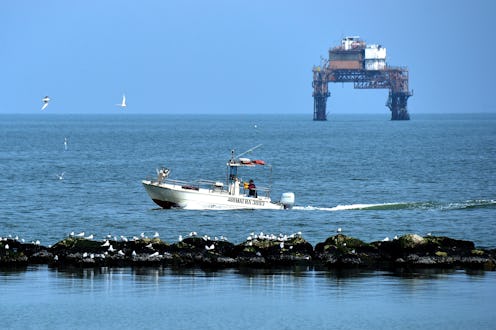News
Obama's Drilling Ban Won't Go Down Without A Fight
In a surprise move exactly a month before the start of Donald Trump's term, President Obama announced on Dec. 20 that he is invoking a little-known 1953 law to permanently ban offshore drilling in specific areas of the Atlantic and Arctic oceans. Known as the Outer Continental Shelf Lands Act, this law allows presidents to ban oil drilling in the aforementioned regions — and Obama's directive demands that those lands never be used for oil again. On the surface, Obama's drilling ban seems to be permanent and legally-defensible, though oil industry members are already discussing ways they can attack it.
The language in the original 1953 act states that a president "may, from time to time, withdraw from disposition any of the unleased lands of the outer continental shelf," and was initially created to define the "outer continental shelf" regions of the United States for the purpose of oil drilling. Despite being invoked and amended several times since its inception, the OCSLA does not offer provisions regarding what will happen if a president decides to permanently ban drilling in the outer continental shelf. According to a briefing by environmental law advocates ahead of the landmark decision, this ban is most likely to hold up due to it's delineation of an "articulated purpose."
Despite the legal strength of Obama's directive, there's little doubt that the oil industry and its allies within the Trump administration (potentially including the president-elect himself) will begin working almost immediately to undo this ban. In a statement to the Los Angeles Times, American Petroleum Institute's Erik Milito expressed his confidence that the order will be overturned:
Fortunately, there is no such thing as a permanent ban, and we look forward to working with the new administration on fulfilling the will of American voters on energy production.
That said, an Obama administration official told the LA Times that they, too, are confident in the strength of the order because the directive doesn't include reversal provisions and that, at the very least, legal challenges would take multiple years of litigious and Congressional action.
The unprecedented nature of Obama's directive makes its future uncertain — there isn't a playbook for how well an order of this nature will stand up, because all other withdrawals under the OCSLA have been intentionally temporary. Despite the anti-Obama and pro-oil fervor of the incoming administration, this groundbreaking executive order has a good chance of remaining intact.
